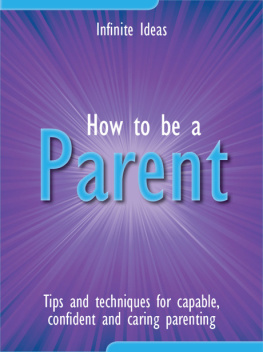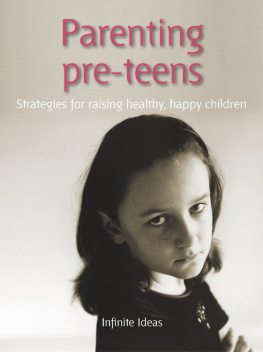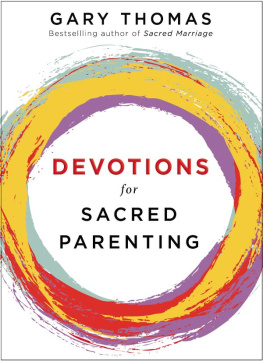Parenting under 5s
Strategies for raising young children
Infinite Ideas
Previously pubilshed in paperback as Raising young children

8. The childminding minefield
If you need to work and have no family around to look after your little ones you need a childminder.
For many couples and single parents, the option of one parent being at home looking after the kids isnt practical or affordable. And even when this might be possible, more and more women are reluctant to abandon a career and training they have worked so hard to achieve. Great childminders are worth their weight in gold and make a huge difference to your childrens quality of life.
Time spent researching is well rewarded. You need to know more than qualifications. Can you all get on? Will you be able to resolve conflicts? Are her thoughts and feelings about child rearing more or less similar to your own? Consider practical issues such as getting to and from her place, fees and her flexibility if you get held up at work.
See plenty of candidates and prepare a questionnaire to help you analyse how well prospective childminders will fit in. Some childminders run their service like mini nurseries with cookery and painting sessions, while others just plonk children in front of the telly until you return.
It is vital to build up a good working rapport with childminders. Short handovers identifying problems ensure that difficulties can be resolved at an early stage. It is important to listen and observe your children as well to make sure they are happy with the arrangement.
The relationship your child has with her childminder is dynamic. Things change. We have known childminders who were delighted to look after other peoples kids when their own children hadnt started school as it provided them with playmates but became less happy as the children got older. It helps to have regular meetings say once a quarter, to review progress.
Heres an idea for you
Make a contract with your childminder detailing everything that is relevant: extra money for late arrival, mobile phone number where you can be contacted in an emergency. Give formal notice of times you will be dropping off and picking up, date and payment method. Stick to your side of the contract, no matter what.
9. Supersavers
Theres no doubt about it feeding a family can be an expensive business. So read our top ten tips to cut your food bills by up to 20%.
1. Make a proper shopping list. Take some time to roughly plan your meals for the week and then write down what you need. Keep paper and a pencil in the kitchen, so you can write down items as you run out of them.
2. Shop once a week and leave the kids at home. This will give you time to think about what youre buying, check prices and look for bargains.
3. Remember that buy one, get one free and three for two offers are only good value if they are for products you would buy anyway.
4. The cheaper brands will usually be hiding on the lower shelves because bigger manufacturers will pay to have their brands displayed at eye level.
5. Buy in bulk, but make sure you only bulk buy items you use regularly, non-perishables (like loo roll) and items with a distant use by date.
6. Seasonal fruit and veg will always be cheaper than the just flown in from Kenya sort. Adapt your cooking to accommodate seasonal foods and buy fresh produce from local markets rather than supermarkets.
7. If youre not going to the supermarket for a major shop, take a basket at the door. Its harder then to overload with unnecessary items.
8. As a rule its much cheaper to eat foods made from scratch than prepared foods so limit ready meals.
9. Make good use of your freezer. Next time you cook whether it be lasagne, soup or cake double the amount, then freeze half of it.
10. The highest-cost item on many peoples shopping lists is meat so start cooking one or two vegetarian meals every week.
Heres an idea for you
Cant decide what to cook tonight? Forget expensive cookery books, just visit a celebrity chefs web site for free online recipes. Try www.nigella.com, www.jamieoliver.net or www.deliaonline.com .
10. Safe as houses
How do you go about toddler-proofing your home?
No parent can watch a toddler all the time so you need strategies for reducing risks from ordinary household hazards, so your children dont get hurt when your attention is momentarily diverted.
The most important thing is to go round your home looking at it from a toddlers point of view. You can eliminate most bathroom accidents by using non-slip rugs, taking the lock off the bathroom door and locking medicines away in a high cupboard.
Put safety locks on cupboards and drawers, especially the ones where you keep sharp implements. Store cleaning products out of reach, wrap appliance cords as short as is practical and secure with a tight elastic band. Avoid tablecloths to prevent your toddler from pulling them along with the tables contents down on her head. Beware free-standing lamps that toddlers can push over, smashing windows, glass ornaments, televisions, glass-topped coffee tables or the lamps bulb.
Try to create at least two clear paths through any room so children can move easily and safely. If you have furniture with sharp edges, you dont have to get rid of it, just cover the corners with bubble wrap and masking tape until your navigator is older. Check that houseplants within reach are not poisonous, and dont have dangerous spikes, small leaves or gravel which toddlers could choke on. Move fragile ornaments away from low shelves and other accessible areas until your children have learned both to understand the word no and have good co-ordination.
Garages and garden sheds are full of dangers for toddlers. Weedkiller, paint, power and hand tools can all cause serious problems in the wrong hands. One solution is to make garages/sheds no-go areas for toddlers. Alternatively have a clear out and treat yourself to some new toddler-proof storage boxes to organise everything so they can play safely.
Heres an idea for you
Take your children shopping to try safety gates out before you buy them. Some models look good, but quick-witted children can open them easily.
11. Are we nearly there yet?
Follow our tips and rather than dreading long trips, youll soon look forward to spending time in the car with your children.
Everyone loves music. Unfortunately everyone loves different music. While three hours of Tristan and Isolde might send you to Wagnerian heaven, your toddler might not enjoy it and equally 3 hours of nursery rhymes will drive you up the wall. Compromise. Give everyone an allotted time to be DJ and play their favourite music for, say, 20 minutes. Sing-songs are a great low-tech way of passing time. As an alternative to music, listening to an audio book should keep children quiet.
Try some of the following games. Make Backseat Bingo cards on your computer before you go. Instead of a card with numbers, children have to spot and cross off things they are likely to come across on the way, like a flock of sheep, service station, purple car and specific town names. If your drawing skills arent up to scratch cut pictures out of magazines for easy recognisability.
Play Tall Tales. Start with One day my family went on a car journey and take turns to add a sentence at a time. See who can keep a straight face for longest.
Chocolate melts. Sweets cause sticky messes. Crisps make children thirsty. So what can you take to eat? Cubed cheese, sausage rolls, buns with fillings like peanut butter or chocolate spread, carrot batons, cucumber sticks, seedless grapes, pineapple chunks, berries, dried fruit and juice go down well and rarely come back up. Give each child a sports bottle of juice. Youll have fewer spills. If the weather is good, why not plan a picnic at one of the rest stops?
Next page



















